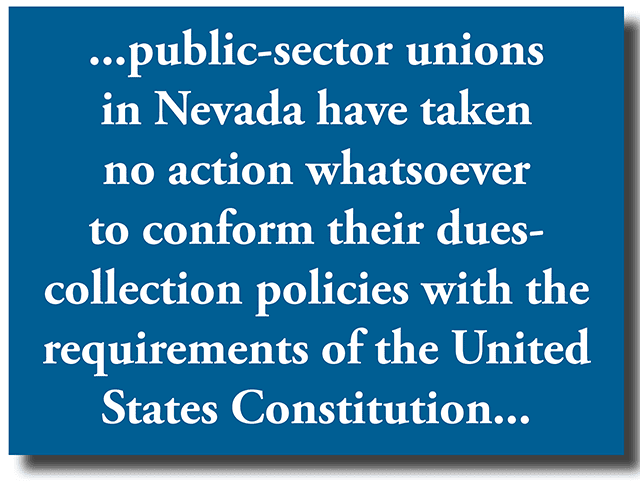Having suffered historic job losses, Nevada families are struggling to rebuild their livelihoods. Policymakers should focus on ensuring barriers to entrepreneurship and gainful employment are torn down.
The following policies, if implemented swiftly, will empower individual workers to more easily pursue their own economic prosperity without government getting in the way.
The following policies should be vigorously pursued to allow Nevada workers the freedom necessary to flourish in the wake of the COVID-19 economic crisis.
Click on the below topics to jump to that section:
-
Temporary suspension of occupational licensing fees

Occupational licensing schemes governing thousands of private workers across the state place undue burdens on those wishing to pursue their own gainful employment in a variety of lower-income occupations such as cosmetology, contracting, barbering, and interior design, among myriad others. (The Institute for Justice has taken the national lead on research and litigation efforts in this area. Click here for more information.)
A temporary suspension of all occupational licensing fees, which cost individuals hundreds of dollars annually, would provide workers with much-needed financial relief, while also encouraging job creation at a time when we need it the most.
>>>Click here to return to the top of the page<<<
-
Temporary suspension of public-sector union dues
A suspension of public-sector union dues would keep millions in the wallets of Nevada’s local-government workers and boost the state’s economy — without costing taxpayers a dime — precisely when Nevadans need it most.
More important, however, are the legal implications which underscore this proposal. Lawmakers must act now in order to rectify Nevada’s constitutionally-defective scheme of deducting dues from workers’ paychecks in ways which violate the First Amendment rights of government employees.
As determined by the landmark 2018 Supreme Court case Janus v. AFSCME, it is unconstitutional for any government-sector union to deduct dues from workers’ paychecks unless those workers have affirmatively consented to waiving their First Amendment rights. A majority of justices deemed such a waiver — “freely given and shown by ‘clear and compelling’ evidence” — necessary due to the inherently political nature of union activism, which is directly subsidized by membership fees.
 Writing for the majority, Justice Alito remarked that schemes which take dues from workers’ paychecks without first acquiring affirmative consent “violate the First Amendment and cannot continue.”
Writing for the majority, Justice Alito remarked that schemes which take dues from workers’ paychecks without first acquiring affirmative consent “violate the First Amendment and cannot continue.”
The justice elaborated: “Neither an agency fee nor any other payment to the union may be deducted from a nonmember’s wages, nor may any other attempt be made to collect such a payment, unless the employee affirmatively consents to pay. By agreeing to pay, nonmembers are waiving their First Amendment rights, and such a waiver cannot be presumed.” (Emphasis added.)
By this standard — which is now the law of the land — the dues-deduction schemes governing public employees across the state are blatantly unconstitutional. No current government-union members in Nevada ever met this standard when agreeing to union membership because they were never instructed that paying money to a union would constitute a waiver of their free-speech rights.
That fact notwithstanding, it has been nearly two years since Janus was correctly decided, yet public-sector unions in Nevada have taken no action whatsoever to conform their dues-collection policies with the requirements of the United States Constitution.
Lawmakers should follow the lead of states like Alaska and Texas, both of whom recently declared the necessity of acquiring affirmative consent before deducting members’ dues, and not further delay compliance. It is entirely appropriate to suspend union dues until such a time when systems are in place to fully inform public employees of the implications of financially supporting a union. Our state’s public servants, after all, are entitled to a clear understanding of the costs and benefits of union membership — particularly given the economic uncertainty which lies in the months and years ahead, as union dues take hundreds from workers’ paychecks each year.
>>>Click here to return to the top of the page<<<
